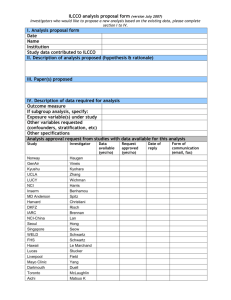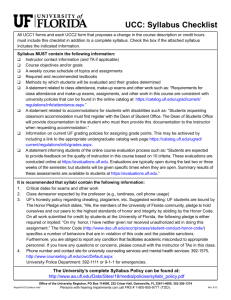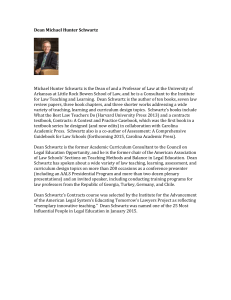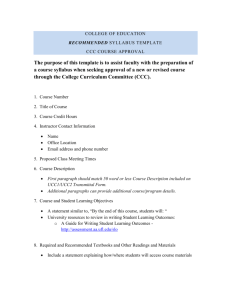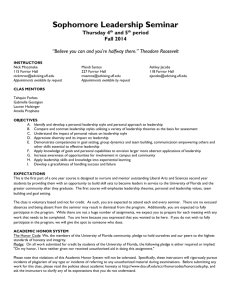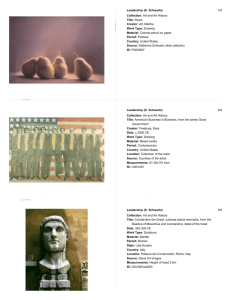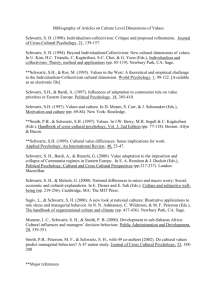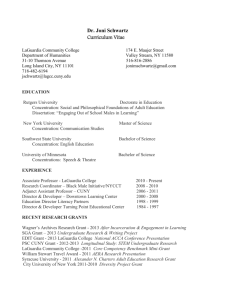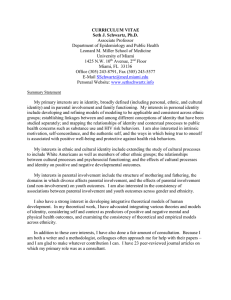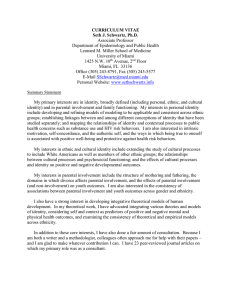INR 3034 – Hozic
advertisement
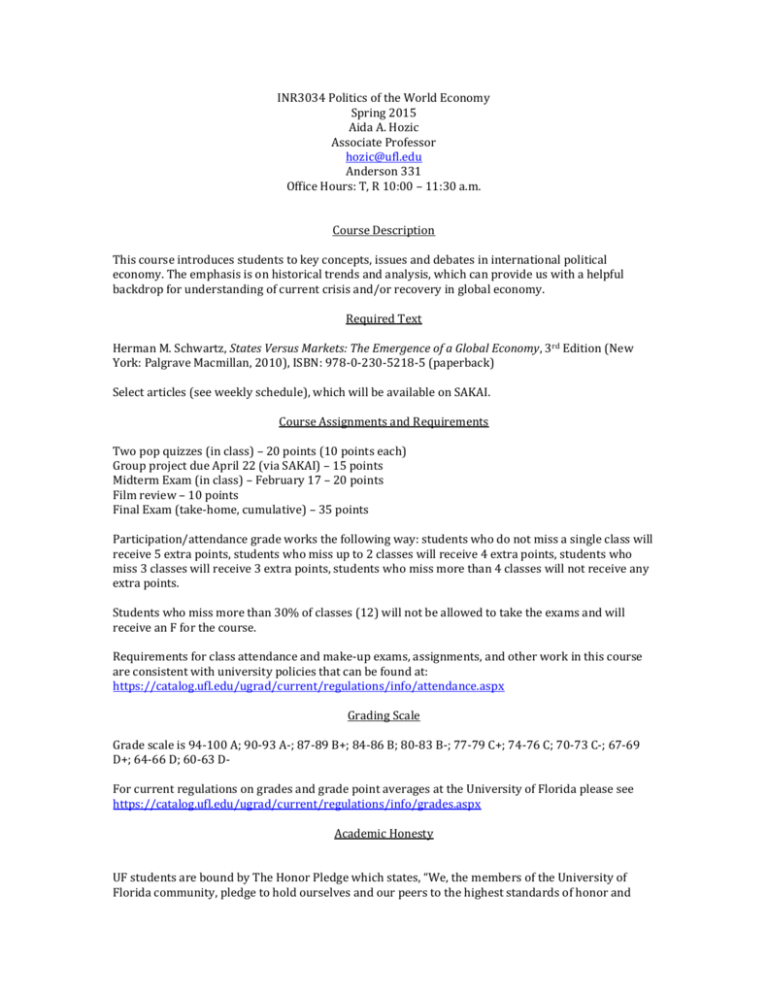
INR3034 Politics of the World Economy Spring 2015 Aida A. Hozic Associate Professor hozic@ufl.edu Anderson 331 Office Hours: T, R 10:00 – 11:30 a.m. Course Description This course introduces students to key concepts, issues and debates in international political economy. The emphasis is on historical trends and analysis, which can provide us with a helpful backdrop for understanding of current crisis and/or recovery in global economy. Required Text Herman M. Schwartz, States Versus Markets: The Emergence of a Global Economy, 3rd Edition (New York: Palgrave Macmillan, 2010), ISBN: 978-0-230-5218-5 (paperback) Select articles (see weekly schedule), which will be available on SAKAI. Course Assignments and Requirements Two pop quizzes (in class) – 20 points (10 points each) Group project due April 22 (via SAKAI) – 15 points Midterm Exam (in class) – February 17 – 20 points Film review – 10 points Final Exam (take-home, cumulative) – 35 points Participation/attendance grade works the following way: students who do not miss a single class will receive 5 extra points, students who miss up to 2 classes will receive 4 extra points, students who miss 3 classes will receive 3 extra points, students who miss more than 4 classes will not receive any extra points. Students who miss more than 30% of classes (12) will not be allowed to take the exams and will receive an F for the course. Requirements for class attendance and make-up exams, assignments, and other work in this course are consistent with university policies that can be found at: https://catalog.ufl.edu/ugrad/current/regulations/info/attendance.aspx Grading Scale Grade scale is 94-100 A; 90-93 A-; 87-89 B+; 84-86 B; 80-83 B-; 77-79 C+; 74-76 C; 70-73 C-; 67-69 D+; 64-66 D; 60-63 DFor current regulations on grades and grade point averages at the University of Florida please see https://catalog.ufl.edu/ugrad/current/regulations/info/grades.aspx Academic Honesty UF students are bound by The Honor Pledge which states, “We, the members of the University of Florida community, pledge to hold ourselves and our peers to the highest standards of honor and integrity by abiding by the Honor Code. On all work submitted for credit by students at the University of Florida, the following pledge is either required or implied: “On my honor, I have neither given nor received unauthorized aid in doing this assignment.” The Honor Code. On all work submitted for credit by students at the University of Florida, the following pledge is either required or implied: “On my honor, I have neither given nor received unauthorized aid in doing this assignment.” The Honor Code specifies a number of behaviors that are in violation of this code and the possible sanctions. Furthermore, you are obligated to report any condition that facilitates academic misconduct to appropriate personnel. If you have any questions or concerns, please consult with the instructor. Students with Disabilities Students with disabilities requesting accommodations should first register with the Disability Resource Center (352-392-8565, www.dso.ufl.edu/drc/ ) by providing appropriate documentation. Once registered, students will receive an accommodation letter which must be presented to the instructor when requesting accommodation. Students with disabilities should follow this procedure as early as possible in the semester Course Evaluations Students are expected to provide feedback on the quality of instruction in this course by completing online evaluations at https://evaluations.ufl.edu. Evaluations are typically open during the last two or three weeks of the semester, but students will be given specific times when they are open. Summary results of these assessments are available to students at https://evaluations.ufl.edu/results/ Weekly Schedule Week 1 (January 6, 8) Course overview, syllabus and requirements Week 2 (January 13, 15) Basic macro-economic terms. Week 3 (January 20, 22) Rise of the Modern State (Chapter 1 in Schwartz, States vs Markets) Charles Tilly “War Making and State Making as Organized Crime” in Peter B. Evans, Dietrch Rueschemeyer, Theda Skocpol (eds.), Bringing the State Back In, Cambridge University Press, New York, 1985, pp. 169-191 Week 4 (January 27 - no class, work on group projects, January 29) Origins of International Economic Inequality (Chapter 2 in Schwartz, States vs Markets) Immanuel Wallerstein, “Rise and Future Demise of the World Capitalist System: Concepts for Comparative Analysis,” Comparative Studies in Society and History 16:4 (Sept 1974), 387-415 Week 5 (February 3, 5) Economic and Hegemonic Cycles (Chapter 3 in Schwartz, States vs Markets) Peter Taylor “What is Modern About the Modern World System,” Review of International Political Economy, 3:2, Summer 1996: 260-286 Week 6 (February 10, 12) The Industrial Revolution and Late Development (Chapter 4 in Schwartz, States vs Markets) Alexander Gerschenkron, "Economic backwardness in historical perspective" in Gerschenkron, Economic Backwardness in Historical Perspective (New York: Frederick A. Praeger Publishers) Week 7 (February 17, February 19 – no class) Midterm Exam in class on February 17th. Search for Labor (Chapter 5 in Schwartz, States vs Markets) Week 8 (February 24, 26) Expansion and crisis in the 19th Century Economy (Chapters 5-7 in Schwartz, States vs Markets) P.J. Cain and A.G. Hopkins, “Political Economy of British Overseas Expansion 1750-1914” Economic History Review 33:4 (Nov 1980) 463-490 Michael Monteon, “The British in the Atacama Desert: The Cultural Basis of Economic Imperialism,” Journal of Economic History 35:1, 1975 Week 9 (March 3, 5) Spring Break Week 10 (March 10, 12) The “American Century” (Chapters 8 and 9 in Schwartz, States vs Markets) John Williamson, “On the System in Bretton Woods,” The American Economic Review 75:2 (May 1985), pp. 74-79 Week 11 (March 17, 19) Transnational Corporations (Chapter 10 in Schwartz, States vs Markets) Oliver E. Williamson, “Transaction-Cost Economics: The Governance of Contractual Relations,” Journal of Law and Economics, 22:2 (October 1979), pp. 223-261 Week 12 (March 24, 26) Industrialization of the Old Periphery (Chapter 11 in Schwartz, States vs Markets) Alice H. Amsden, “The State and Taiwan’s Economic Development,” in Peter B. Evans, Dietrch Rueschemeyer, Theda Skocpol (eds.), Bringing the State Back In, Cambridge University Press, New York, 1985, pp. 78-106 Week 13 (March 31, April 2) Trade, Protection and Globalization (Chapter 12 in Schwartz, States vs Markets) Michael D. Bordo, Barry Eichengreen, Douglas A. Irwin, “Is Globalization Today Really Different than a Globalization a Hundred years Ago?” NBER Working Paper 7195, issued in June 1999. Week 14 (April 7, 9) The End of the American Hegemony? (Chapter 13-14 in Schwartz, States vs Markets) Susan Strange, “The Persistent Myth of Lost Hegemony,” International Organization 41:4 (Autumn, 1987), pp. 551-574 Week 15 (April 14, 16) Financial Crisis and its Aftermath Michael Lewis, “How the Eggheads Cracked,” The New York Times Magazine, January 24, 1999 Jeff Maddrick, “The Wall Street Leviathan” The New York Review of Books, April 28, 2011 Paul Krugman, “How the Case for Austerity Has Crumbled,” The New York Review of Books, June 6, 2013 Paul Krugman, “Why We’re in a New Gilded Age,” The New York Review of Books, May 8, 2014 Week 16 (April 21) Recap – Global economy, where next? Questions, questions and more questions.
